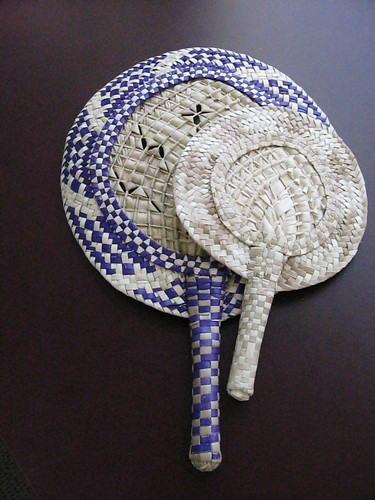Long before
modern maps, the islanders of the Marshall Islands would map out the ocean
swells and islands using sticks and shells. These stick charts as they’re
called use to sticks and fibers to map out the major swells in the ocean and
the shells mark where the islands are located that caused changes in
directions. This was used as a way for the islanders to navigate their way to
other islands. What you end up with is almost a modern, Frank Lloyd
Wright-esque frame of sticks tied at various angles and curves. Some can be
small and other can be quite large. It’s rather fascinating.
Much of
their art is tied to handicrafts and especially woven arts. Popular items
include baskets, mats, purses, hats, fans, and wall hangings. Each of these are
made from natural materials found on the island, including coconut fibers,
pandanas leaves, and shells.
Locals also
develop an array of products using coconut, from detergents to hand creams.
Coconut is very good for your skin and hair and is environmentally safe. Not to
mention quite plentiful on the islands.
Another part
of their culture, especially before the arrival of the Europeans, was
tattooing. Both males and females were tattooed, although the designs and body
parts that were tattooed vary slightly between the sexes. Different designs
signified different family clans and ranks within the family. The Marshallese
also stretched out their ear lobes, some as large as three inches. Sounds like
they were punk before punk was punk.
The early
Marshall Islanders told their stories orally. Most of these stories were
legends and stories used to explain their world around them, but some stories also
told of historical events. Today, many of these oral traditions have been
retold and written down.
The Marshall
Islands have also served as the setting for many European writers, some who either
lived there for a while or had visited the islands. No doubt these islands had
a lasting impression on them. A few notable writers who have written about the
Marshall Islands or used it as their setting are Jane Downing, George Lewis
“Louis” Becke, Rudolph von Scheven, and Ernest George Moll.
There isn’t a
large canon of literature from the islands. Although Marshallese is the
official language, and certainly used in the language of government documents
and so forth, most of the books I’ve seen mentioned are written in English.
However, if you’re interested in folktales, one book to read is called Marshall Islands Legends and Stories by
Daniel A Kelin II. This book contains 50 stories collected from the local
storytellers.
Up next: music and dance






No comments:
Post a Comment